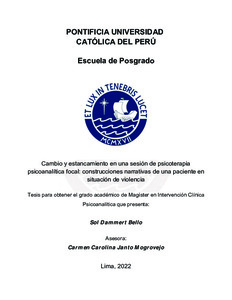| dc.contributor.advisor | Janto Mogrovejo, Carmen Carolina | |
| dc.contributor.author | Dammert Bello, Sol | |
| dc.date.accessioned | 2023-05-10T22:08:14Z | |
| dc.date.available | 2023-05-10T22:08:14Z | |
| dc.date.created | 2022 | |
| dc.date.issued | 2023-05-10 | |
| dc.identifier.uri | http://hdl.handle.net/20.500.12404/24960 | |
| dc.description.abstract | El estudio de momentos relevantes para el cambio o la obstaculización de este (Greenberg,
1986) tiene la finalidad de entender y mejorar la práctica de la psicoterapia (Rice & Saperia,
1984). En Perú, se ha utilizado el modelo de Krause et al. (2006) de indicadores de cambio
genérico para estudiar el cambio subjetivo en procesos de psicoterapia psicoanalítica breve con
mujeres víctimas de violencia de género, mas no han sido consideradas las dificultades
asociadas al cambio. Consideramos que los efectos desestructurantes de la violencia contra las
mujeres podrían obstaculizar el proceso de cambio de esta población, el cual de por sí no es uno
lineal (Gonçalves et al., 2011). No se han encontrado estudios previos sobre la relación entre
cambio y estancamiento en mujeres que reciben psicoterapia psicoanalítica focal. Por ello, el
presente estudio busca responder a la pregunta: ¿cómo se relacionan los episodios de cambio y
de estancamiento de una mujer víctima de violencia a lo largo de una sesión de psicoterapia
psicoanalítica focal? Para ello se analiza un caso único sistematizado de un proceso de doce
sesiones de un terapeuta y una mujer víctima de violencia de género. Se analiza la sesión siete
con herramientas del método fenomenológico-narrativo de Duero et al. (2021) y posteriormente
se realiza un análisis temático. Los resultados de este estudio encuentran que el estancamiento
surge luego del cambio y se asocia al efecto desestabilizador de este, así como a factores del
encuadre, el uso de la agresión, los efectos de la experiencia de violencia, la necesidad de
reconocimiento y conflictos asociados a la maternidad. Estos resultados son discutidos a partir
de una lectura psicoanalítica que articula lo intrapsíquico e intersubjetivo, y toma en cuenta la
participación del terapeuta en el estancamiento. Se discuten estos resultados en su aporte al
trabajo terapéutico con esta población, en tanto es necesario que el terapeuta pueda comprender
las obstaculizaciones al cambio como parte del proceso de construcción del mismo. | es_ES |
| dc.description.abstract | The study of significant moments associated with psychic change (Greenberg, 1986) has the
purpose of understanding and improving the practice of psychotherapy (Rice & Saperia, 1984).
In Perú, Krause´s et al. (2006) generic change indicators has been used to study subjective
change in brief psychotherapy processes with women victims of gender violence, but the
difficulties associated with change have not been considered. We consider that the destructuring
effects of violence against women could hinder the process of change in this population, which in
itself is not a linear one (Gonçalves et al., 2011). No previous studies have been found on the
relationship between change and stuckness in women receiving focal psychoanalytic
psychotherapy. Therefore, the present study seeks to answer the question: how are the episodes
of change and stuckness of a woman victim of violence related throughout a session of focal
psychoanalytic psychotherapy? For this purpose, a single systematized case of a twelve-session
process of a therapist and a woman victim of gender violence is analyzed. Session seven is
analyzed with tools of the phenomenological-narrative method of Duero et al. (2021) and
subsequently a thematic analysis is carried out. The results of this study find that stuckness arises
after change episodes and is associated with the destabilizing effect of psyhic change, as well as
factors related to the framing, the use of aggression, the effects of the experience of violence, the
need for recognition and conflicts associated with motherhood. These results are discussed on
the basis of a psychoanalytic reading that articulates the intrapsychic and intersubjective, and
takes into account the involvement of the therapist in the stuckness. These results are discussed
as a contribution to the therapeutic work with this population, since it is necessary for the therapist
to understand the obstacles to change as part of the process of its construction. | es_ES |
| dc.language.iso | spa | es_ES |
| dc.publisher | Pontificia Universidad Católica del Perú | es_ES |
| dc.rights | info:eu-repo/semantics/closedAccess | es_ES |
| dc.subject | Psicoterapia breve | es_ES |
| dc.subject | Violencia contra la mujer--Aspectos psicológicos | es_ES |
| dc.subject | Psicoanálisis | es_ES |
| dc.title | Cambio y estancamiento en una sesión de psicoterapia psicoanalítica focal: construcciones narrativas de una paciente en situación de violencia | es_ES |
| dc.type | info:eu-repo/semantics/masterThesis | es_ES |
| thesis.degree.name | Maestro en Intervención Clínica Psicoanalítica | es_ES |
| thesis.degree.level | Maestría | es_ES |
| thesis.degree.grantor | Pontificia Universidad Católica del Perú. Escuela de Posgrado. | es_ES |
| thesis.degree.discipline | Intervención Clínica Psicoanalítica | es_ES |
| renati.advisor.dni | 07266591 | |
| renati.advisor.orcid | https://orcid.org/0000-0002-7217-614X | es_ES |
| renati.author.dni | 73067782 | |
| renati.discipline | 313127 | es_ES |
| renati.juror | Mantilla Lagos, Carla Eugenia | es_ES |
| renati.juror | Janto Mogrovejo, Carmen Carolina | es_ES |
| renati.juror | Ugarte Villalobos, Andrea Susana | es_ES |
| renati.level | https://purl.org/pe-repo/renati/level#maestro | es_ES |
| renati.type | https://purl.org/pe-repo/renati/type#tesis | es_ES |
| dc.publisher.country | PE | es_ES |
| dc.subject.ocde | https://purl.org/pe-repo/ocde/ford#5.01.00 | es_ES |






